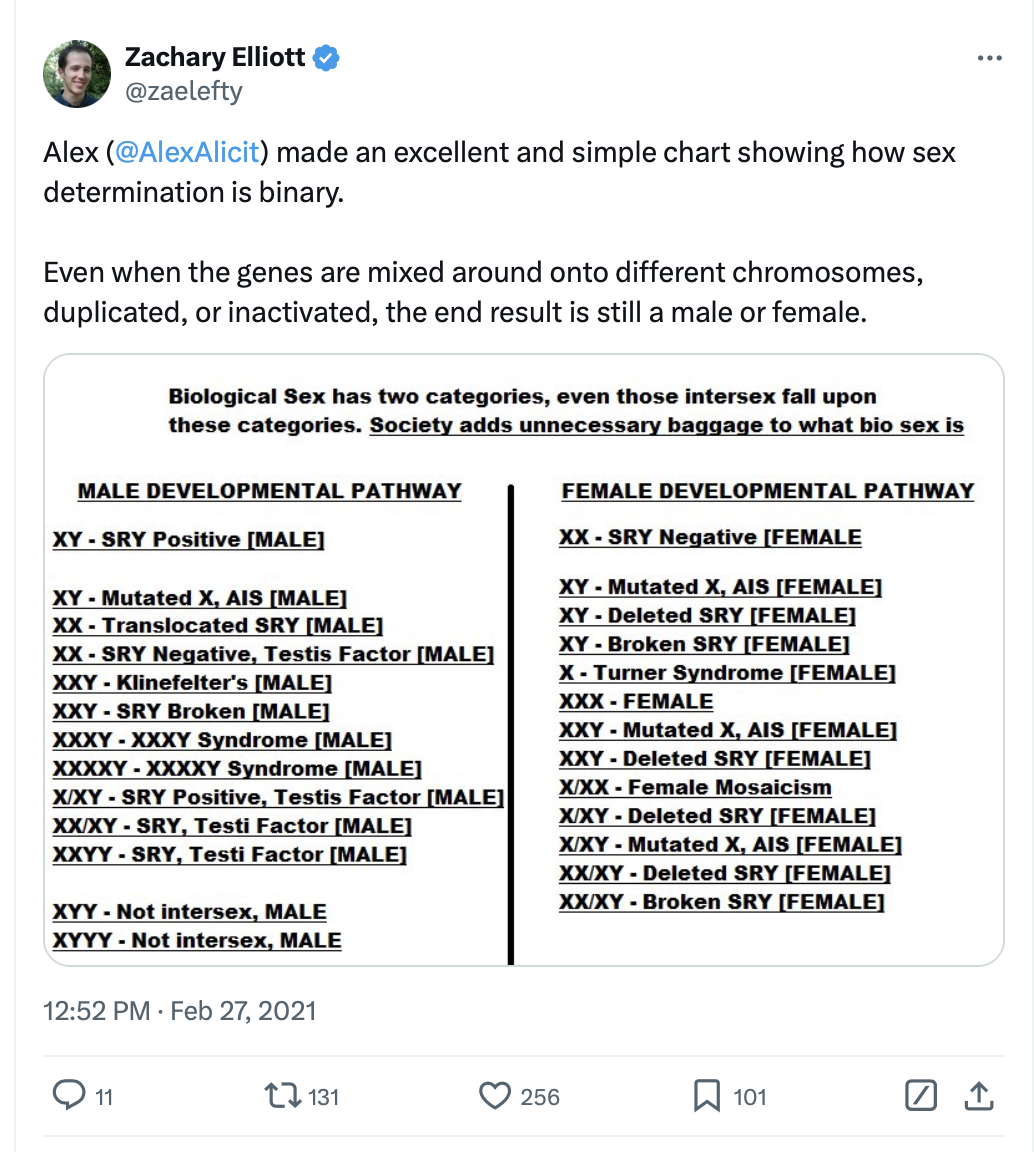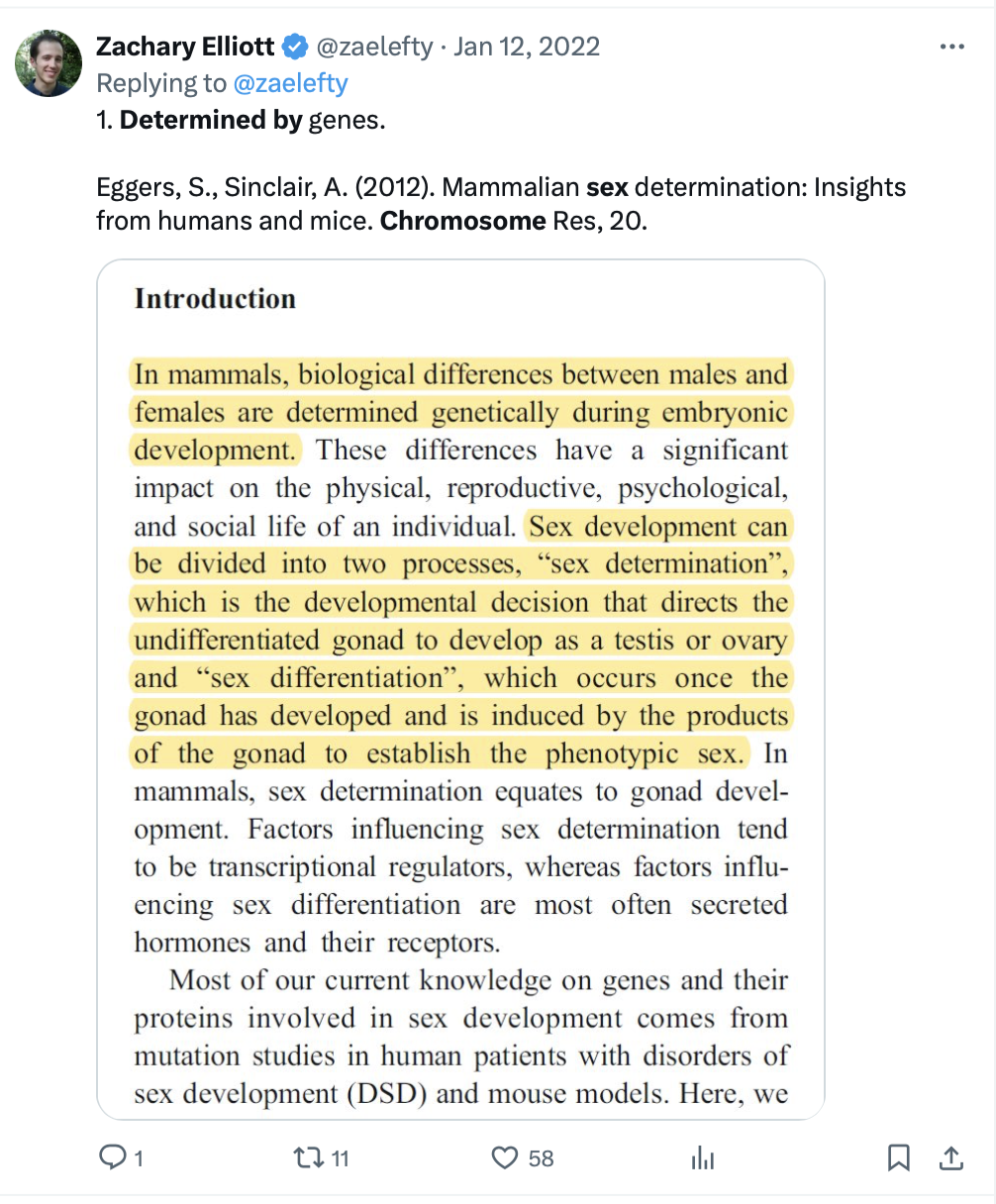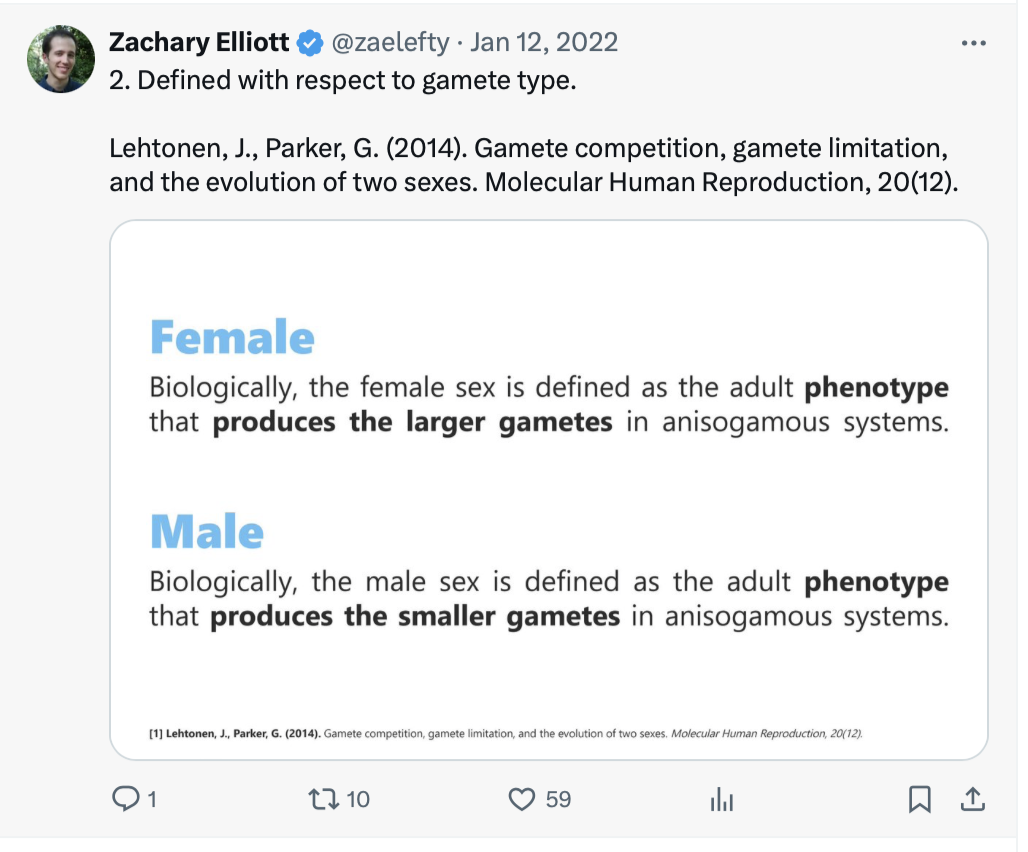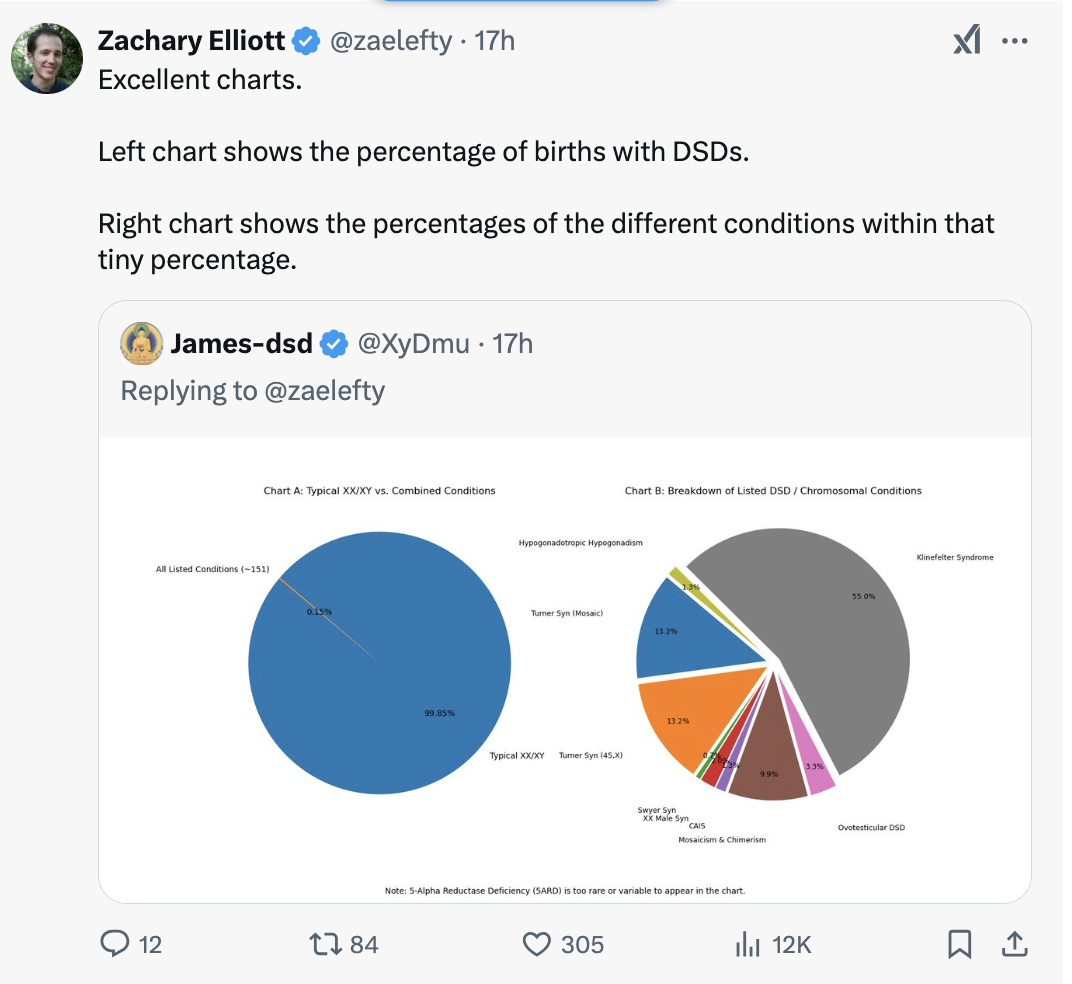There are only two biological sexes because there are only two types of gametes. Yes, some people are difficult to categorize by simply looking at their bodies, but if they produce a gamete (a cell capable of combining with another cell to produce a human being), it will be either an egg or a sperm, not a spegg nor any other functional option. See this short video produced by the Paradox Institute.
Almost inevitably, upon taking this position, you will hear people who have inhaled gender ideology say the “But intersex people exist.” Intersex conditions exist, but they are rare (2/10,000), much rarer than the (approximately 1.4/100) of 13-17 year old teenagers now claiming to be transgender. Consider the following chart, which illustrates the number of intersex people compared to the numbers of people whose sex is obvious by simply looking:
How does the Intersex Gambit unfold? You will be challenged with the following, which I’ve heard in person several times from people formally educated enough to know better than to screw up something everyone learned in high school biology. They will say something like this: “Sex is not binary because intersex people exist and this demonstrates that biological sex is a spectrum.” Biologist Colin Wright, author of “Understanding the Sex Binary,” elaborates. Gender ideologists advises:
If no single line can be drawn, then anywhere someone chooses to draw one is totally arbitrary and subjective. If it’s totally arbitrary and subjective, then that means the categories male and female are also arbitrary and subjective “social constructs” with no firm root in biological reality. If that’s the case, why are we categorizing people in law according to these arbitrary labels instead of letting people simply label themselves? To do otherwise is to oppress people based on a biological falsehood.
Wright laments that this argument is made with “stunning success” and that it has even been embraced by “parts of the scientific establishment and the medical profession.” Those using this argument include historian of science Alice Dreger.
In her book, Hermaphrodites and the Medical Invention of Sex, Dreger refers to intersex individuals as “hermaphrodites,” and says: “Hermaphroditism causes a great deal of confusion, more than one might at first appreciate, because—as we will see again and again—the discovery of a ‘hermaphroditic’ body raises doubts not just about the particular body in question, but about all bodies. The questioned body forces us to ask what exactly it is—if anything—that makes the rest of us unquestionable.”
Wright disentangles this mess:
Those without a firm background in biological science may read such passages and feel something akin to having an epiphany, but Dreger is peddling pseudoscience. This desire to extrapolate a small blur at a boundary to the entire picture is rooted in the postmodern impulse to “queer,” and thereby eliminate, natural categories. In the queer-theory worldview, categories are themselves oppressive, and human liberation requires the “troubling” of categories (to borrow Judith Butler’s term), including those of sex. Yet Dreger’s account does not accurately describe biological reality. The existence of “questionable” cases with respect to sex classification does not automatically cast a degree of doubt onto everyone’s sex. For most people, their sex is obvious.
Besides, our society is not currently experiencing a sudden dramatic surge in people stricken with ambiguous genitalia; we are experiencing a surge in people who are unambiguously one sex claiming to “identify” as the opposite sex, or neither sex.
At this point in the discussion, the activists typically refer to relatively rare configurations of chromosomes:
Activists purport to debunk this misrepresentation of the sex binary by pointing to sex-chromosome aneuploidies—instances where an individual may have missing or extra X or Y chromosomes, such as in those with Klinefelter (XXY) and Turner (X0) syndrome, among others. How could sex be binary and based on sex chromosomes, they argue, if there are more combinations beyond XX and XY?
There are several major issues with this line of reasoning. The first is that the vast majority of people with sex-chromosome aneuploidies are not intersex; their primary sex organs and anatomy are unquestionably either male or female. Other compositions than the typical XX and XY arrangement do not represent additional sexes beyond male and female, but instead represent chromosomal variation within each of the two sexes. A person with Klinefelter syndrome (XXY), for example, isn’t a new sex in the same way that a person with Down syndrome (who has three instead of two copies of chromosome 21) isn’t a new species.
Wright repeatedly sets out the gold standard: To determine which of the two sexes a person is, ask what kind of gamete that individual produces (or is or was capable of producing).
[A]though an individual’s sex is mechanistically determined in different ways, it is always defined the same way—by the type of gamete his or her primary reproductive organs is organized around producing.
Whenever activist try to clutter their mind to justify their fantasies, re-read this standard definition for sexual reproduction from John Maynard Smith & Eörz Szathmáry, The Major Transitions in Evolution, W. H. Freeman and Company, 1995, p 149:
Sexual reproduction is a type of reproduction that involves a complex life cycle in which a gamete (haploid reproductive cells, such as a sperm or egg cell) with a single set of chromosomes combines with another gamete to produce a zygote that develops into an organism composed of cells with two sets of chromosomes (diploid).
The mechanism for this convoluted reasoning is social intuitionism, discussed at length by Jonathan Haidt, who devised the elephant and rider illustration. The activists don’t start by sifting through conflicting evidence. They start with their goal and then work backwards, a process fueled by out-of-control empathy. Then they snap their fingers and reverse-engineer one of the deepest and oldest findings of biology. Yes, they are fucking up biology. Truly, they don’t care about science. They only care about their own issue du jour. They don’t care whether the are pressuring career scientists to utter nonsense regarding one of the most stable and well-established findings of biology. That’s where this going, with career biologists and professors being sent off to struggle sessions. See here and here.
It is believed that sex arose 1.2 billion years ago. That is almost ten times longer than flowers (which appeared about 130 MYO) have existed. Following excerpt is from Wikipedia, “Evolution of sexual reproduction“:
In the eukaryotic fossil record, sexual reproduction first appeared about 2.0 billion years ago in the Proterozoic Eon, although a later date, 1.2 billion years ago, has also been presented.
Two sexes exist in every bird, dinosaur, mammal and primates. They exist in every dog, fish, Tulip, apple tree, Turkey, flatworm and snake. These organisms and many others reproduce sexually and mixing the two kinds of gametes is the only reproductive strategy available to any of these organisms. Apparently, however, sexual reproduction involving two-and-only-two sexes occurs in every mammal except human beings, according to gender ideologists. It reminds me that many religions embrace human exceptionalism when they try to put humans on a pedestal: For many religions, there are, on the one hand, the animals, and on the other hand, there are humans, who are not like any of the other animals. That’s because humans have souls. Religions employ evidence-free human exceptionalism. Religions such as gender ideology. They do it because many people struggle mightily with the idea that human beings ARE animals. See here for why it is critically important for us to recognize that humans find it incredibly distasteful to think of themselves as animals.
This is not the last word in gender ideology, of course. But I would suggest that the reason that activists fight so incredibly hard to unhinge the biological sexual reproduction their way of seeing the word is that this reality is stubborn and sexual reproduction is the most stubborn part of human life. If only they can convince all of us that biological sex presents no barriers of any kind to humans, they are free to make shit up all day, every day. They can then pretend that they are gods who can conjure up anything they want and call it “reality.” Doing this would turn complete control over society to mobs who know things solely because they feel them.
[Added Feb 1, 2024
Richard Dawkins on Intersex. His point that intersex is irrelevant to the transgender movement is critically important. Almost none of the people who call themselves transgender are biologically “intersex.”
The way the non-binary faithful obsess about intersexes, and about individuals who can’t produce gametes, amounts to a pathetic clutching at straws while they drown in postmodern effluent. Yes, some fish change from sperm-producing male to egg-producing female (or vice versa). That very statement relies on the gametic definition of male & female. Ditto hermaphroditic worms & snails who can produce both male & female gametes.
In any case, the existence of intersexes is irrelevant to transexualist claims, since trans people don’t claim to be intersexes. Also, as if it matters, humans are not worms, snails, or fish.
The rare tetra-amelia syndrome (babies born without limbs) does not negate the statement that Homo sapiens is a bipedal species. The rare four-winged bithorax mutation does not negate the statement that Drosophila is a Dipteran (two winged) fly. Similarly, the occasional individual who can’t produce gametes doesn’t negate the generalisation that mammals come in only two sexes, male and female, defined by games size.
Sex is binary as a matter of biological fact. “Gender” is a different matter and I leave that to others to define.
[Supp Dec 14, 2024]
Zach Elliot: “Alex (@AlexAlicit) made an excellent and simple chart showing how sex determination is binary. Even when the genes are mixed around onto different chromosomes, duplicated, or inactivated, the end result is still a male or female.”
Zachary Elliot: “Determined by genes. Eggers, S., Sinclair, A. (2012). Mammalian sex determination: Insights from humans and mice. Chromosome Res, 20”
Zachary Elliot:
- Defined with respect to gamete type. Lehtonen, J., Parker, G. (2014). Gamete competition, gamete limitation, and the evolution of two sexes. Molecular Human Reproduction, 20(12).
[Supp Jan 21, 2025]
Zachart Elliott offers this on “intersex” disorders:
People with “intersex” disorders, which are not actually in between sexes, have sex-specific conditions. Some only affect males. Others only affect females.
Knowing their sex is critical for medical treatment.
For example, XX Congenital Adrenal Hyperplasia can result in overproduction of androgens in a female fetus, resulting in external genitalia that appears ambiguous, even though she has ovaries and a full Mullerian (female) genital system.
If we view this ambiguous genitalia as a healthy variation, and do not treat their hormonal issues medically, it can result in the death of the baby. This is because CAH can cause severe salt-wasting due to the adrenal glands not functioning properly, causing severe dehydration and organ failure. The “ambiguous” genitalia is a byproduct or marker for this adrenal problem. Knowing her sex is critical to treat her properly, to know what healthy hormone levels she needs and what is going on with her body.
There are many other examples of sex-specific disorders of sex development that may result in ambiguity but cause sex-specific issues that we can’t see just through external observation. Understanding their sex is the first step in treatment so that they can live long and healthy lives.
Elliott further offers a series of 8 videos on “Disorders of Sex Development”:
[Supp Jan 23 2025]
In his new article, Biology is Not Bigotry, Colin Wright brings togther the concepts of gametes and “intersex”:
But why should sex be changeable while other physical traits cannot? Feelings don’t create reality. Instead, in biology “sex” is traditionally defined by the size and mobility of reproductive cells (“gametes”). Males have small, mobile gametes (sperm in animals and pollen in plants); females have large, immobile gametes (ova in plants and eggs in animals). In all animals and vascular plants there are exactly two sexes and no more. Though a fair number of plants and a few species of animals combine both functions in a single individual (“hermaphrodites”), these are not a third sex because they produce the typical two gametes.
It’s important to recognize that, although this gametic idea is called a “definition” of sex, it is really a generalization—and thus a concept—based on a vast number of observations of diverse organisms. We know that, except for a few algae and fungi, all multicellular organisms and vertebrates, including us, adhere to this generalization. It is, then, nearly universal.
Besides its universality, the gametic concept has utility, for it is the distinction between gamete types that explains evolutionary phenomena like sexual selection. Differential investment in reproduction accounts for the many differences, both physical and behavioral, between males and females. No other concept of sex has such universality and utility. Attempts to define sex by combining various traits associated with gamete type, like chromosomes, genitalia, hormones, body hair and so on, lead to messy and confusing multivariate models that lack both the universality and explanatory power of the gametic concept.
Yes, there is a tiny fraction of exceptions, including intersex individuals, who defy classification (estimates range between 1/5,600 and 1/20,000). These exceptions to the gametic view are surely interesting, but do not undermine the generality of the sex binary. Nowhere else in biology would deviations this rare undermine a fundamental concept. To illustrate, as many as 1 in 300 people are born with some form of polydactyly—without the normal number of ten fingers. Nevertheless, nobody talks about a “spectrum of digit number.” (It’s important to recognize that only a very few nonbinary and transgender people are “intersex,” for nearly all are biologically male or female.)
In biology, then, a woman can be simply defined in four words: “An adult human female.”
[Supp Feb 20 2024]
I found these charts useful:











I can see the desire to want to correlate this ideology with “religion” as a means by which to mock it and demonstrate its irrationality, but I don’t think this is the right card to play.
Many religious persons disagree with this ideology because it is simply untrue and their religion points to science and the means by which to elucidate the reality of the natural world which is already known in the supernatural world. Before we had science demonstrate sex to us empirically, religious persons knew what “man” and “woman” was. They even knew that some persons couldn’t be easily represented by “man” or “woman” (i.e. intersex) but never they were not “man” or “woman”. Atheists may not believe God (or some other supernatural entity created “man” and “woman” but that’s not to say theists and atheists can’t agree on the biological reality of the material world.
Contrast this to atheists who do believe these ideologies to be true despite insisting religion is false – they don’t believe the ideology is true because they believe it is true (i.e. faith) but because they think they know it is true (i.e. reason) and they often rest on science (e.g. psychology, psychiatry and now some obscure biology) to justify their reasoning.
Excerpt from: “Intersex Is Not as Common as Red Hair: The claim that intersex people comprise 1.7% of the population is wildly inaccurate.”
When these common DSDs are removed, and intersex conditions are more precisely defined as “conditions in which chromosomal sex is inconsistent with phenotypic sex, or in which the phenotype is not classifiable as either male or female,” Fausto-Sterling’s 1.7 percent figure drops dramatically. According to Sax, “Applying this more precise definition, the true prevalence of intersex is seen to be about 0.018%, almost 100 times lower than Fausto-Sterling’s estimate of 1.7%.”
While the prevalence of intersex conditions, defined in Sax’s clinically-relevant sense, is quite low, this by no means justifies any of the mistreatment, whether socially or medically, that many gender activists hope to prevent when they overstate its prevalence. How we treat people, and the rights afforded to them, should not be predicated on their prevalence within a population. And that is the point we should be trying to normalize, rather than false statistics.
This post is funny to me because by breaking down people to what gamete they produce, is that not also going back to bioessentialistic principle? That seems like a very slippery slope to go down, and also, is uncomfortable as hell in practice. You wouldn’t go up to someone and say, “Hey, so what gamete do you produce ’cause I’m not like, gay, or anything.” Also, does this mean that people that are, say, born without *any* functioning biologic system (you say in this post capable of was capable, but this ignores people who just blatantly weren’t able, ever) are just sexless? Oddly progressive stance, I respect it.
This is, of course, ignoring the obvious flaw in “Sex and gender aren’t the same thing and you should not be treating them as such”. And the, “hey, 0.02% of the population is still a lot of people,” because this seems to be written from the same standpoint as the more extreme belief I see of, “We shouldn’t need wheelchair ramps if it’s such a small amount of the population!”
in response to Ryder’s question – “is that not also going back to bioessentialistic principle?”. I’d ask in what way does “this post” infer there are humans that are “naturally less good”?